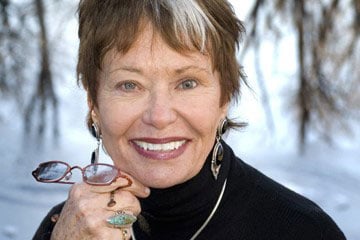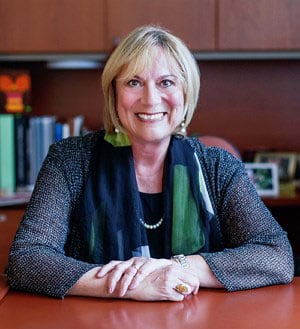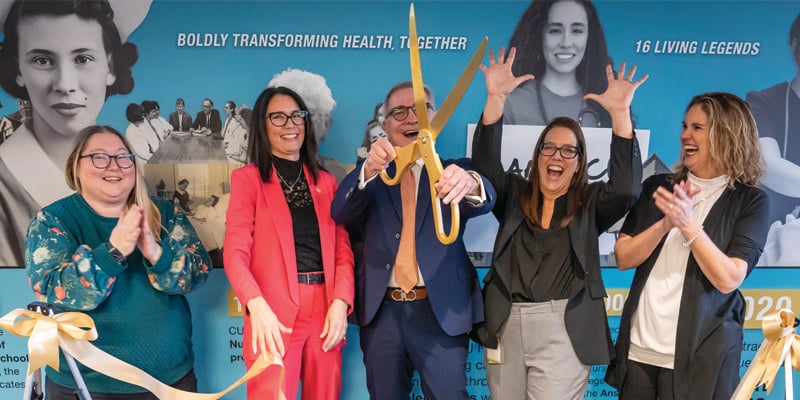With academic roots tied to the University of Colorado College of Nursing, Marlaine Smith, RN, PhD, said she considered Monday’s keynote presentation a homecoming.
“I’m fortunate to reflect on my own journey in learning caring science and growing caring science,” Smith told a group of more than 40 faculty and PhD students gathered for the first day of PhD Intensives, January 30 at the CU College of Nursing. “The global beacon for caring science is right here where we are standing now.”
“The global beacon for caring science is right here where we are standing now.” –Marlaine Smith, RN, PhD, Professor, Florida Atlantic University Christine E. Lynn College of Nursing
Currently a professor at the Florida Atlantic University Christine E. Lynn College of Nursing where she served as dean for eight years, Smith is widely regarded as a thought leader in caring science – an evolving philosophical-ethical field of study that is grounded in the discipline of nursing. Smith’s research includes a multi-site, controlled trial focusing on massage therapy and simple touch for people with advanced cancer in hospice care.

Jean Watson, (PhD '73) and former dean of CU Nursing. |
Once a faculty member of CU Nursing, Smith credited the influence of her mentor, Jean Watson, (PhD ’73) for establishing CU Nursing’s first doctoral program, among other achievements that advanced caring science.
Dr. Watson, a CU Nursing alumna and former dean of the college, is renowned throughout the world for her theory of human caring. She has authored numerous books and founded the nonprofit Watson Caring Sciences Institute.
Watson’s research and scholarship on caring has been embraced by hundreds of nursing schools and healthcare facilities around the world. In 2013, the American Academy of Nursing honored Watson as a “Living Legend” in nursing. One of the largest healthcare delivery systems, Kaiser Permanente, has implemented Watson’s theory in California for many years. Watson is the recipient of 16 honorary doctorates – including 13 internationally. She also held the title of Distinguished Professor of Nursing; the highest honor accorded to CU Nursing faculty for scholarly work.
“Jean Watson was the dean (of CU Nursing) when I worked here,” Smith said. “She’s certainly a transformational leader who brought her vision of caring to the college in many ways in curriculum development. The doctoral program she developed was a professional practice program steeped in caring.”
Watson started her academic career at CU Nursing in 1973 and retired from the college in 2012 after serving myriad roles for the institution. Smith said Watson’s time at CU Nursing represented a high point in the evolution of caring science as an academic discipline. True to the legacy, CU Nursing still offers a PhD in Nursing in Caring Science.
“Jean invited faculty associates, poets and all kinds of physicians and healthcare leaders to join in what became an epicenter for human caring,” Smith said. “It was really a think tank where faculty from within the college and outside the college gathered to talk about projects that could advance caring in teaching research practices.”
A call to integrate caring science to practices
Though Watson’s vision has been embraced worldwide, not every clinician and academic is necessarily “on board” with her research and scholarship. Some argue that caring science is not true science and lacks the level of empirical evidence required for rigorous scientific study.
|
Keynote Speaker: Marlaine C. Smith, RN, PhD, AHN-BC, HWNC-BC, FAAN |
Acknowledging the skeptics, Smith encouraged the audience to celebrate CU Nursing’s legacy in caring science and integrate the concepts of caring science into their professional and academic roles for the benefit of patients, students and healthcare practitioners alike. Smith said that while caring science might be perceived as an “academic discipline” rather than a “professional discipline,” its principles are essential to nursing education and nursing practices.
“Disciplines certainly encompass more than science because disciplines include ethics,” she said. “They embrace philosophies besides science, dimensions of theory and research.”
Indeed, in a time when burnout and turnover is prevalent in nursing and throughout the healthcare field, Smith said a large measure of caring science could restore nurses’ sense of purpose.
“Nurses are thirsting for this,” Smith said. “They want a meaningful practice that’s based on nursing values and knowledge and one that’s relationship-centered.”
Smith ended her keynote presentation by asking participants to imagine a healthcare system with a greater emphasis on caring science.
“What if nursing practice was infused with rituals to deepen our connection to ourselves and others? What if we listened to and honored our nurses’ stories of love and caring, and the difference it made to us and others? And what if we started all meetings gathering classes with a pause to center ourselves and be present in the moment? I invite you to think about this,” she said.




